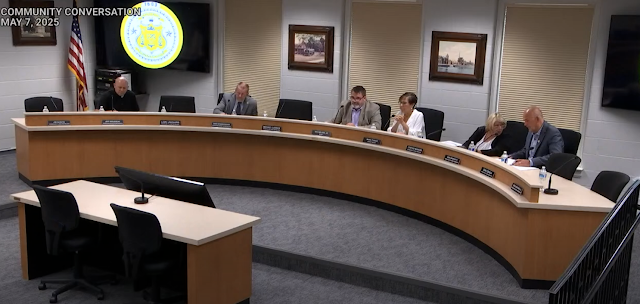Enfield Can’t Outsource Its Conscience


In the 2021 municipal election, Enfield Democrats won 7 out of the 11 council seats, helped by a voter turnout of about 7,850 -- a substantial 19% increase over the 2019 municipal election. To maintain a majority, the Democrats will likely need a similarly strong turnout on Nov. 7
But the Democrats face obstacles this time because of revaluation. Property taxes increased by around 10% for many.
Meanwhile, council Republicans are leveraging this increase in taxes. They've taken to their mailers, chastising Democrats as having "gone hog wild with taxes and spending." Aside from being false, this criticism overlooks Enfield's underlying issues — issues for which the Republicans, after 14 years at the helm, cannot evade responsibility.
You can think about revaluation like Warren Buffett talks about stock market declines: "Only when the tide goes out do you learn who has been swimming naked." It means everything looked good until the market crashes, and then people learned who was in trouble.
Similarly, Enfield's economic challenges, such as the departure of Mass Mutual, the waning of Enfield Square, and the slow growth in our industrial areas (barring Eppendorf's success), are now laid bare in the tax bills.
When a revaluation increases the tax burden on residential properties, economic development isn't keeping up. A shift in tax burden to residential unfolds over many years but stays hidden until a revaluation. Republicans want voters to forget they had control of the council and budget for a nearly a decade and a half until two years ago. But the tide has gone out, and what the revaluation exposes is their failure to prepare Enfield for the future.
For sure, macroeconomic dynamics are responsible for many of our problems. For instance, Lego's migration to Boston for its expansive labor market is beyond Enfield's immediate control. The home value rise and declining office market are national issues.
But there's no mystery about what's happening in Enfield. As the town's recently adopted Plan of Conservation and Development notes: "Overall, Enfield's economic position is vulnerable. The loss of jobs, population, young persons, and increased vacancies in certain commercial office and retail space create concerns regarding the future prosperity of the community."
This revaluation impact is no surprise, which is precisely the point. But the Republicans are trying to make the tax increase seem like the result of Democrats' budget decisions -- all within the last two years. It's a sham argument. Let's be clear: The Council Democrats and Republicans have no path to significant budget cutting without layoffs and cuts in services. That will only accelerate Enfield's problems.
The council isn't about to lay off police and EMS, sanitation, or public works employees, and that's the bulk of the town's spending, apart from education. Of the approximately 350 full-time town employees, 110 are in public safety. Even if the council starts laying off employees, it won't be enough to matter and it will just drive overtime up. The town's workload stays the same.
But the Republicans seem more willing to kick the school system to the curb and cement its status as an Alliance District, a state designation for the neediest school districts.
On the financial matters, Council Chair Bob Cressotti and the Democrats did the right thing with the budget. The school budget increase covers fixed costs; they didn't add new programs. He made a point of arguing that the town needs to attract young families, and education is where it starts. Chairman Cressotti reaffirmed what's important to our community.
The Democrats are also moving on economic development. They are giving much more attention to addressing the Enfield Square problem and are studying improvements for the broader area. They are just getting started and deserve more time.
The Republicans have no realistic short-term plan for mitigating the impact of the revaluation and the truth is, there isn't one. And I don't know whether they have a long-term plan, either. Most of the town and school budgets are tied up in wages. The best the council can do next year is keep taxes from rising again, which will probably involve deep cuts.
Town voters are smart enough to know that the Democrats didn't create this problem in two years, but they could still be punished. That's the reality of politics. That said, the Republicans will be motivated to show up on Nov. 7 in the hope of regaining their majority, and the town's Democratic voters need to do so as well.